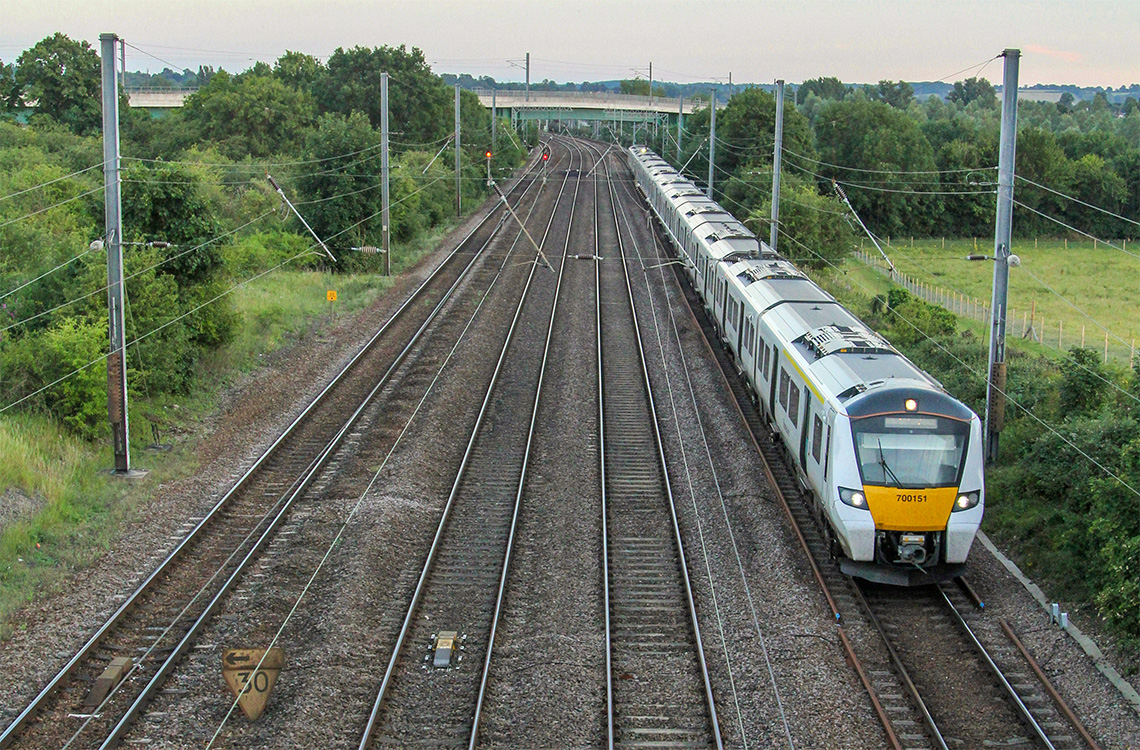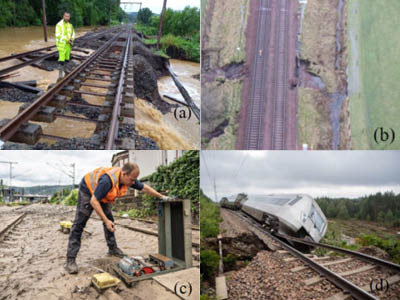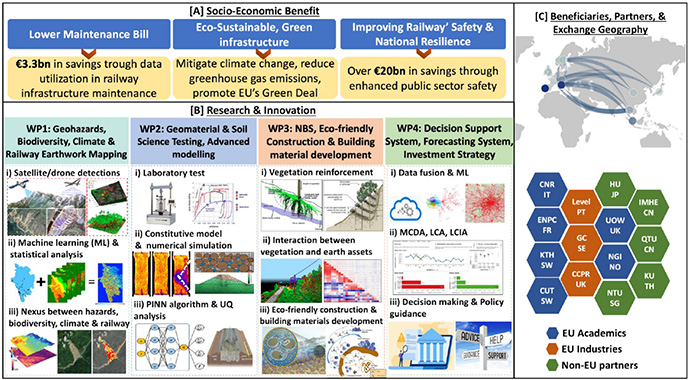RESOLVE: Developing climate-resilient and eco-sustainable railway earthwork by mitigating geohazards while balancing biodiversity

The European railways span nearly 230,000 kilometers across the continent, covering over 420,000 hectares of land and serving as a critical facilitator of human mobility and goods transportation for centuries. However, the construction of these railway earthworks has permanently altered the geomorphic and hydrological features, resulting in increased soil erosion and biodiversity disruptions.
These railway earth assets are also prone to damage from geohazards and deterioration, exacerbated by escalating extreme weather events caused by climate change. The European railway network, despite being one of the world's busiest and safest, faces a continual challenge in maintaining this safety standard, demanding significant maintenance investment. Additionally, the importance of biodiversity conservation in railway earthwork maintenance and construction has been overlooked until recently. Biodiversity-conscious practices can enhance soil stability, mitigate erosion, and diminish geohazard occurrences like landslides and flooding. The RESOLVE project aims to address these challenges by integrating scientific, engineering, and environmental disciplines to develop eco-sustainable and climate-resilient railway infrastructure.

Overall methodology
The RESOLVE project employs a comprehensive and integrated methodology to achieve its research and innovation objectives. This methodology involves several key components:
- Integration of heterogeneous data using techniques like data mining, which spans railway geological information, satellite imagery, ecological data, and climate data.
- Leveraging big data interoperability through data science technologies, including machine learning algorithms such as Physics-Informed Neural Networks (PINN) and model-based machine learning, alongside statistical analysis with uncertainty quantification.
- Conducting advanced laboratory tests to explore internal erosion, root-soil interactions, surface runoff, and nature-based solutions (NBS) for ground reinforcement.
- Implementing advanced field surveys for short-, medium-, and long-term monitoring.
- Providing evidence and guidelines to support decision-making and design processes.
This multi-disciplinary approach aims to reveal hidden correlations that can serve as constraints for numerical models, addressing core geotechnical challenges in railway earthworks. These models will explore connections between geohazards, climate, and biodiversity, integrating multi-criteria decision analysis (MCDA) with life cycle assessment (LCA) and life cycle impact assessment (LCIA).
KTH, as the leader of WP3, will actively contribute to all parts of this project. Specifically, KTH will focus on developing NBS to reinforce railway earthworks and restore adjacent habitats, thereby enhancing the resilience and sustainability of railway infrastructure.

Impact and significance
The RESOLVE project is designed to generate significant scientific, societal, and economic impacts through its innovative approach. The project aims to develop new and lasting research collaborations and achieve knowledge transfer that benefits participating organizations. This will enhance the research and innovation potential within Europe and globally by:
- Developing eco-friendly and NBS for railway earthwork stability and biodiversity restoration.
- Establishing a forecasting and decision support system to prioritize maintenance activities and allocate resources effectively.
- Enhancing the resilience of railway infrastructure to climate change impacts, thereby reducing maintenance costs and improving safety standards.
- Promoting biodiversity conservation along railway corridors, contributing to ecological stability, and enhancing community well-being.
- Generating new training and career pathways for researchers, equipping them with skills for roles in academia, government, and industry.
The anticipated outcomes will provide essential insights for transitioning to adaptive governance and reinforcing the EU's leading position in sustainable railway infrastructure development.
Consortium and collaborative expertise
RESOLVE brings together a team of world-class scientists and highly skilled non-academic partners. The originality and innovation of RESOLVE lie in integrating disciplines and linking scientific communities by grouping experts from academia, the private sector, and trainees into new, inter-sectoral approaches and objectives. The team has interdisciplinary expertise in civil engineering, geoscience engineering, data science, life science, and hazard management. Formed with 11 world-leading research organizations and 3 companies across Europe and internationally, RESOLVE aims to ensure comprehensive, robust, and implementable solutions for railway network climate resilience and eco-sustainable development.
The RESOLVE secondees will enjoy a highly integrated, interdisciplinary, and intersectoral staff exchange, sharing know-how and skills development through planned secondments, network-wide events, and local training. This collaborative and dynamic environment is crucial for addressing the project's scientific and technical objectives, ensuring that research outcomes translate into practical solutions for climate-resilient and eco-sustainable railway infrastructure.
Project period
2024–2028
Funding
The RESOLVE project is funded under the Horizon Europe framework, specifically through the Marie Skłodowska-Curie Actions (MSCA) for Staff Exchanges.
Contact person
Participants
- Community CPR Trust CIC, United Kingdom.
- Consiglio Nazionale Delle Ricerche, Italy.
- Chalmers University of Technology, Sweden.
- Ecole Nationale Des Ponts et Chaussees, France.
- Geochange Consulting E.U., Austria.
- Faculty of Engineering, Hokkaido University, Japan.
- Institute of Mountain Hazards and Environment, China.
- KTH Royal Institute of Technology, Sweden.
- Kasetsart University, Thailand.
- Levels & Measures LD, Portugal.
- Stiftelsen Norges Geotekniske Institutt, Norway.
- Nanyang Technological University, Singapore.
- Qingdao University of Technology, China.
- The University of Warwick, United Kingdom.
